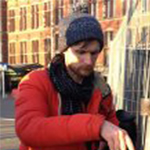The issue
For nearly 20 years, award-winning television production company Wild Rover Productions has created and produced hit shows such as Just For Laughs, Secret Fortune and Take the Money and Run, which air on major networks worldwide including the BBC and ITV, and ABC in the US.
Facing growing competition from an increased number of TV channels and challenges from changes in viewer habits due to video-on-demand, Wild Rover recognised potential in emerging new media such as virtual reality (VR) and augmented reality (AR). They had a vision of becoming a key player in immersive programming by adapting their existing television formats to these new platforms as well as generating exciting new immersive content themselves. But creating compelling programmes for VR or AR can be slow and expensive.
In addition, aside from games, the market for immersive media content is young and volatile with few established business models.
The research
Professor John Mateer is an established academic as well as a film and television industry veteran of over 30 years. An experienced producer, he has developed television formats including one involving virtual reality for a cutting-edge game show. He has been involved in VR research since the 1990s and also published on the business of screen media, including the impact of ‘digital disruption’.
Dr Guy Schofield is an expert in immersive media, having published more than 25 journal articles and conference papers on performative interfaces, interactive storytelling, and the design of compelling immersive experiences. He has been actively engaged in developing both hardware systems and software solutions for immersive content creation that represent the intersection of art and technology.
Together, they undertook a two-year Knowledge Transfer Partnership with Wild Rover Productions to help the company achieve its aims by applying their existing research knowledge in a commercial setting and undertaking new enquiries specifically designed to find solutions to the challenges the company faced.
Professor Mateer led the exploration into market conditions and business models to inform company strategy. Originally Wild Rover had thought cinematic virtual reality programming (aka 360° video, the form most closely related to conventional TV) would be the best medium to target. However, research conducted with the business associate revealed this market was growing more slowly than projected so the focus of the enquiry, and the company’s business model, was broadened to include interactive VR, augmented reality and other immersive media variants.
Dr Schofield supervised the research into the design of advanced tools to develop faster VR project visualisation. Drawing on breakthroughs discovered with the technical associate, this resulted in the creation of a real-time tool that enables fast prototyping of projects for a range of immersive media, including VR and AR, as well as performance capture for animation. This has the potential to add production capacity to areas not previously considered.
The outcome
Wild Rover Productions started out with plans to build a cinematic VR production business.
Through the knowledge exchanged and research overseen by Professor Mateer and Dr Schofield, they have not only expanded their offerings to provide a much wider range of immersive media production services but also created a tool with the potential to transform the animation production pipeline for all media.
Based on the strength of the work in the project, Wild Rover increased its virtual reality and other immersive media business turnover by over 100 per cent year-on-year across the two years of the project, and gained significant national and emerging international visibility for its productions and services. This resulted in the company securing a significant investment to formally spin-out a dedicated immersive media company called Retinize, which launched in 2019.


